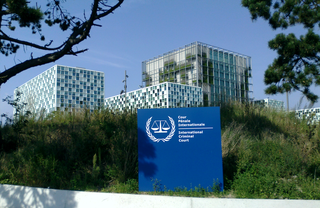 W
WInternational courts are formed by treaties between nations or under the authority of an international organization such as the United Nations and include ad hoc tribunals and permanent institutions but exclude any courts arising purely under national authority.
 W
WThe Economic Court of the Commonwealth of Independent States is a judicial organ which was formed in order to provide exercising of its economic commitments by the participating states. The Court is empowered to consider the disputes in the fulfillment of economic commitments in accordance with international treaties within the framework of the Commonwealth of Independent States. The Court considers other disputes under the agreement of the participating states. It is also empowered to interpret international treaties and the acts of the CIS bodies. The location of the Economic Court is the city of Minsk, Republic of Belarus.
 W
WThe EFTA Court is a supranational judicial body responsible for the three EFTA members who are also members of the European Economic Area (EEA): Iceland, Liechtenstein and Norway.
 W
WThe Extraordinary African Chambers is a tribunal established under an agreement between the African Union and Senegal to try international crimes committed in Chad from 7 June 1982 to 1 December 1990. This period corresponds to the regime of former Chadian President Hissène Habré. The Extraordinary African Chambers were opened 8 February 2013 in Dakar, Senegal. The magistrate Ciré Aly Bâ is the current administrator of the Extraordinary African Chambers in the Senegalese courts.
 W
WThe Inter-American Court of Human Rights is an autonomous judicial institution based in the city of San José, Costa Rica. Together with the Inter-American Commission on Human Rights, it makes up the human rights protection system of the Organization of American States (OAS), which serves to uphold and promote basic rights and freedoms in Latin America and the Caribbean only. The Court rules on whether a State has violated an individual's human rights, rather than if individuals are guilty of human rights violations. 29 of 35 nations in the OAS are also members of the wider-scale International Criminal Court.
 W
WThe Nuremberg trials were a series of military tribunals held after World War II by the Allied forces under international law and the laws of war. The trials were most notable for the prosecution of prominent members of the political, military, judicial, and economic leadership of Nazi Germany, who planned, carried out, or otherwise participated in the Holocaust and other war crimes. The trials were held in Nuremberg, Germany, and their decisions marked a turning point between classical and contemporary international law.
 W
WThe International Residual Mechanism for Criminal Tribunals, also referred to as the IRMCT or the Mechanism, is an international court established by the United Nations Security Council in 2010 to perform the remaining functions of the International Criminal Tribunal for the former Yugoslavia (ICTY) and the International Criminal Tribunal for Rwanda (ICTR) following the completion of those tribunals' respective mandates.
 W
WThe International Tribunal for the Law of the Sea (ITLOS) is an intergovernmental organization created by the mandate of the Third United Nations Conference on the Law of the Sea. It was established by the United Nations Convention on the Law of the Sea, signed at Montego Bay, Jamaica, on 10 December 1982. The Convention entered into force on 16 November 1994, and established an international framework for law over all ocean space, its uses and resources. The ITLOS is one of four dispute resolution mechanisms listed in Article 287 of the UNCLOS.
 W
WThe Kosovo Specialist Chambers and Specialist Prosecutor's Office is a court of Kosovo, located in The Hague (Netherlands), hosting four Specialist Chambers and the Specialist Prosecutors Office, which may perform their activities either at the KRSJI or in Kosovo. The court is currently set up for delegating the trials of the crimes committed by members of the Kosovo Liberation Army (KLA), an ethnic-Albanian paramilitary organisation which sought the separation of Kosovo from Yugoslavia during the 1990s and the eventual creation of a Greater Albania. The alleged crimes concern the period 1998–2000, during and at the end of the Kosovo war and directed afterwards against "ethnic minorities and political opponents". The court was formally established in 2016. It is separate from other Kosovar institutions, and independent. It is composed of a Specialist Prosecutor's Office and four Specialist Chambers, with themselves comprising Judges' Chambers and a Registry.
 W
WThe Nuremberg trials were a series of military tribunals held after World War II by the Allied forces under international law and the laws of war. The trials were most notable for the prosecution of prominent members of the political, military, judicial, and economic leadership of Nazi Germany, who planned, carried out, or otherwise participated in the Holocaust and other war crimes. The trials were held in Nuremberg, Germany, and their decisions marked a turning point between classical and contemporary international law.
 W
WThe Special Tribunal for Lebanon (STL), also referred to as the Lebanon Tribunal or the Hariri Tribunal, is a tribunal of international character applying Lebanese criminal law to carry out the investigation and prosecution of those responsible for 14 February 2005 assassination of Rafic Hariri, the former Lebanese prime minister, and the deaths of 21 others, as well as those responsible for connected attacks.